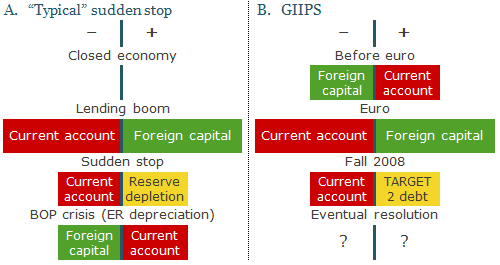Balance of Payments The Current Account
Post on: 16 Март, 2015 No Comment

So what is the Balance of payments?
The Balance of Payments is a record all the economic transactions between the UK and the rest of the world over 1 year.The Balance of Payments has three parts and in this post I want to explore the part called the current account.
So what is the current account?
The current account is a part of the Balance of Payments that looks the imports, exports and investment income.
What are the components of the current account?
There are three components of the current account:
1. Trade of goods visible trade
This is the trade of tangible items such as pens, calculators etc. With cheap imports from China, the UK tends to acquire a negative number for this part.
2. Trade of services invisible
This is the trade of intangible items such as financial services, law services etc. The UK is a financial hub and for this section it tends to acquire a positive number.
3. Net investment income This is profits, dividends and interest from overseas assets. In essence it is an economic injection into the economy.
How do we formulate the current account?
Current account = trade of goods + trade of services + net investment income
What two positions can we acquire from the current account?
We can acquire a TRADE DEFICIT or a TRADE SURPLUS please dont get confused with BUDGET DEFICIT which is what I once did. A trade deficit is when imports outweigh exports and a trade surplus is when exports outweigh imports. The UK has a trade deficit whereas China has a trade surplus.
What are the implications of a deficit?
In the short run this might sound like a great option because it increases the choice of goods and services consumers are exposed to. In turn this can increase consumption hence aggregate demand. However, this means we are not independent and in circumstances like a war we will probably suffer as we arent able to produce enough for our country. Also we might have to continually borrow as we arent able to pay for the debt in the first place causing a larger problem!
What are the implications of a surplus?
Just like in the deficit consumers had more choice in a surplus allocative efficiency decreases restricting consumers to a limited choice. For places like China it can mean that their currency becomes overvalued therefore governments need to invest in other countries. They also loose out on the benefits of trade.
What influence the current account?
Anything that affects exports, imports and investment income can cause the current account to alter.
What influences exports?
- Subsidies can allow productivity to increase and price to drop increasing the number of export sales.
- If other countries are in a recession or boom it will affect the demand for exports
- If the value of the £ decreases then exports will be cheaper and export sales are likely to rise.
- If corporation tax is reduced firms can invest more in productivity
- Higher levels of inflation abroad make our exports seem cheaper.
- If demand increases overseas for reasons such as an increase in population or income.
What influences imports?
- If there is an increase in demand in the UK because of reasons such as increase in population or income
- Demand could also increase because our point in the trade cycle i.e. when we are in a boom
- The wealth effect may lead to more goods being imported
- If goods became cheaper overseas because of reasons such as increased subsidies abroad
-If the UK has high levels of inflations then imports from other countries appear to be cheaper
-If the pound appreciates then imports will increase as they appear to be cheaper
- If tariffs and other regulations are removed from importing then imports may increase as importing becomes cheaper














